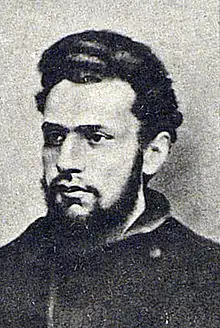Aleksandr Martynov (Russian politician)
Alexandr Martynov (Alexandr Martinov; also, Aleksandr Samoilovich Pikker;[1][note 1]) (12 December 1865, Pinsk – 5 June 1935, Moscow) was a leading Menshevik politician before the Russian revolutions of 1917, and for a few years after the revolution a critic of the Soviet government's theory of permanent revolution (1923).[note 2]

In 1884, he was a member of The People’s Will. From 1901 to 1902 Martynov was active on the journal of the Economist faction of the RSDLP, Rabocheye Delo, publishing articles strongly criticised by Lenin in What Is to Be Done?
After the October Revolution, Martynov started to distance himself from Menshevism. He finally broke with the Mensheviks during the Russian Civil War, and joined the Communist Party in 1923 as an opponent of the "Left Opposition." He was a chief architect of the "bloc of four classes."[2][note 3]
In the 1920s, Martynov worked as a teacher at the Marx–Engels–Lenin Institute, the Communist Academy and the Sverdlov Communist University. From 1924 until his death in 1935, he worked for the Communist International.
See also
Further reading
- Sotsial'demokraticheskiia pobiedy i burzhuezno-demokraticheskie.[note 4] (pseud. [Aleksandr Samoilovich Pikker.]) 1904
- Передовые И Отсталые.[note 5] (pseud. [Aleksandr Samoilovich Pikker.]) 1905.
- Peredovye i otstalye.[note 6] (pseud. [Aleksandr Samoilovich Pikker.]) 1905.
- Мы И Они Лицом К Деревне.[note 7] (pseud. [Aleksandr Samoilovich Pikker.]) 1925
References
- Citations
- The Making of Three Russian Revolutionaries. Edited by Leopold H. Haimson, Ziva Galili y Garcia, Richard Wortman p480
- Glossary of Terms: Bl: Bloc of Four Classes. marxists.org
- Notes
- Russian: Александр Самойлович Мартынов - Пиккер
- According to Leon Trotsky
- See also: New Democracy
- Tr. Social democratic party struggles to exchange degrees of democracy
- Tr. Strictures on the policies of Ilyich Lenin.
- Tr. Forward and backward
- Tr. We and they are facing the countryside
- General